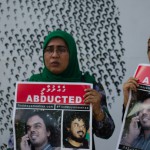Minister of Human Resources Hassan Lateef, has denied that the government has loosened quotas on the hiring of expatriate workers like domestic servants, claiming regulatory reforms published last week had been designed to try “simplify” hiring foreigners.
Lateef told Minivan News that under new reforms, organisations or individuals wanting to hire expatriates would no longer have to apply for a quota before completing a separate application for a work permit, as part of attempts to make hiring foreign staff easier for employees and employers alike.
The minister added that the amendments, expected to be in place from next week, would continue to permit eligible households to hire a single domestic servant only.
“Some media outlets have been reporting that the government has removed quotas on certain expatriate workers, but this is not the idea at all,” he claimed.
Newspaper Haveeru reported today that amendments had been put forward in the government gazette on Thursday (March 26) to lift quota limits on expatriate employees hired to work either for government authorities, or as volunteer social workers or domestic servants.
Lateef claimed that the published reforms represented a procedural change for the Ministry of Human Resources due to concerns that the additional requirements of imposing a quota system on foreign workers was “totally unnecessary” alongside the existing work permit system.
The minister claimed that the process of an employer having to apply for a separate staff quota had made it difficult to replace expatriate staff such as domestic help quickly.
“There is no point in having too many layers in terms of [hiring] procedure. When it comes to household staff, it can be difficult to replace expatriate workers quickly,” he said. “Yet each household can still apply for only one domestic servant. This criteria is exactly the same as before the amendments were put forward.”
After being published in the government gazette, Lateef said that the amendments were expected to come into place next week.
With these amended regulations coming into place within 15 days of their gazette publication, the minister said he believed that collaboration would be needed with other official bodies such as the Department of Immigration and Emigration to oversee the measures.
Immigration issues
Just last month, the Maldives’ Controller of Immigration told Minivan News that the country needed to address its failure in not having adopted a national immigration policy to protect and control an expatriate workforce, which he estimated to at least equal the number of domestic labourers.
Controller Abdulla Shahid said at the time that that a lack of immigration controls or quota policy in the Maldives had left valuable foreign workers vulnerable to “inhumane” treatment from unscrupulous employers once they had legitimately arrived in the country.
Lateef said that in considering these apparent issues with immigration control in the country, he accepted that the Ministry of Human Resources, Youth and Sports would need to work collaboratively with fellow ministries over the changes.
“One cannot separate the issue of hiring expatriate workers between the immigration department and human resources officials. Like with any foreign workers, in hiring domestic servants we do have some [immigration] problems, which is why both systems should be linked,” he said.
Lateef claimed that there was significant work to be done with implementing the new regulations therefore, potentially requiring some additional policy changes to be made by the Department of Immigration and Emmigration.
However, speaking about the amendments to hire expatriate workers and replace the previous quota systems, Immigration Controller Shahid said today that he saw the new system as nothing more than a procedural change that would not significantly impact border control.
Although the changes to the quota requirements were likely to put more responsibility on labour authorities at the Ministry of Human resources, Shahid claimed the system was expected to make hiring expatriate domestic servants a “bit easier” in the country in the future.






Dear minister latheef and controller shahid ,
I wonder why is illegal expatiate a non resolving issue in Maldives whilst yr country does not share any land borders like Bdesh Nepal india or Cambodia Laos Thailand or like us Mexico ? Yrs is so unique .. All expatiate workers arrive with proper documentation with legitimate papers and and employer awaits or even by using fruad malpractices in obtaining quotas or work permits . I mean some individual or a company would exist though the owner may not be aware . So it's an area yr goverment needs to strengthen , in hope of a vote don't just remove the quota system even on selected areas, minister said " there is no point in having too many layers in hiring " if that's the fact why not remove that layer from other areas too when hiring.
Controller shahid I believe its high time to implement forensics or biometrics to resolve this illegal immigrant issues , with out Maldives getting equipped with biometrics I don't find border cannot be controlled . Take the example from ksa Dubai USA , Mongolia etc
You lack a labour migration frame work ?
You need to figure out your human capacity needs well in advance?
Attract people rather than dealing with them on adhoc baisis
Have a Baisic HR need assessment on areas of HR needs
Finalasie areas where expats can't work
Have a max quota issuing amount
Workmon the economics
Strengthen monitoring mechanisms
Do a migratory movement assessment
Give expat freedom of rights for wages health care
Possibly start issuing work visa before they arrive
Make agencies responsible rather than chasing each individual
Have a limit on agencies
Monitor them at regular Intervals
A basic wage would make illegal expatiates more draining yr economy
Making small business out ofnbusiness
And so on and forth
Build a facility to detain which would hinder the effect but will not solve the problem